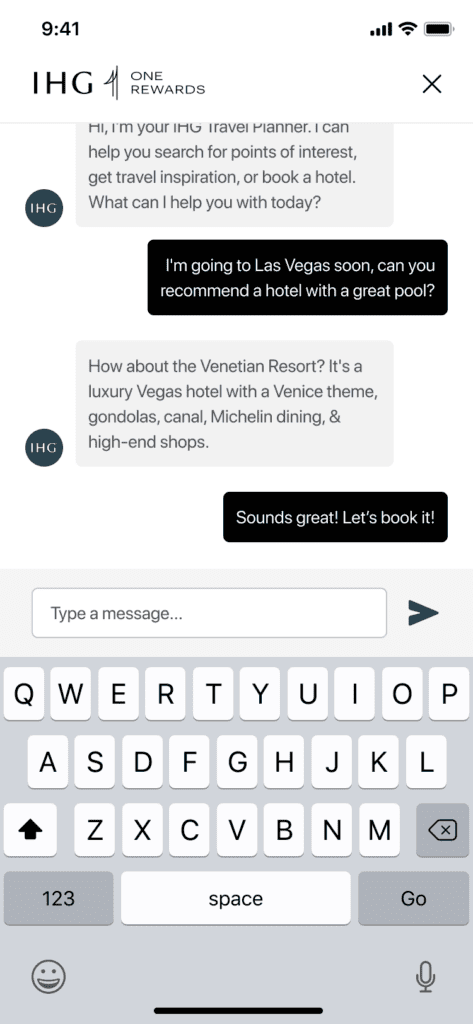Skift Take
IHG Hotels & Resorts sees a future in helping travelers plan their entire trip, not just where to stay.
IHG Hotels & Resorts is planning to release a trip planning tool powered by artificial intelligence from Google.
The hotel giant plans to release the tool in the second half of the year as a feature within its One Rewards mobile app, which the company has been upgrading regularly since relaunching it almost two years ago.
The first version of the AI tool will focus on helping users with the “dreaming phase” of travel, according to Josh Weiss, vice president of guest digital products for IHG.
“We knew that a significant portion of our mobile app users and our web users have their minds made up about where they want to go … but we also know that a substantial portion of people — perhaps even a growing segment of our customers — are open to inspiration,” Weiss told Skift.
This is the first announcement that Google is making about a hospitality company integrating its generative AI tech, according to Carrie Tharp, vice president of strategic industries for Google Cloud.
“You should expect a lot more in the travel space, which is why it’s important to get moving,” Tharp said.
And it’s among the first announcements like it by a hotel brand. Many have said they are experimenting with AI in various ways, but that usually hasn’t included trip planning.
“A lot of the work is on the guest to sort through where they want to go, what are the criteria, and there’s lots of tools that help them do that today, but nothing quite like the experience we used to have decades ago with travel agents,” Tharp said. “And so I think IHG gets to step into the foray of really advancing what digital can do.”
IHG is designing the tool using the Google Cloud platform for building AI software, called Vertex AI. And the AI comes from Google’s proprietary Gemini (formerly Bard) model.
The partnership between the two companies began in 2022 when IHG migrated components of its data to the Google Cloud database. Google has played a big role in helping IHG organize its data and create a foundation that can be used toward new innovations, Weiss said.
The Long-Term Vision
IHG first wants to ensure the core of the tool is valuable, with as few bugs as possible. And then the company plans to upgrade regularly.
The vision is that the chatbot will be able to answer general and specific questions based on Google’s swath of information paired with IHG’s data.
There could also be integrations from third-party travel companies for products like events and attractions bookings. Weiss expects IHG to test several companies to see how their products integrate with the app.
IHG gave a few examples of prompts the chatbot will be able to answer in the long term:
- “Give me four late-night dinner options near the InterContinental London Park Lane.”
- “Does the Kimpton Shinjuku Hotel in Tokyo allow pets?”
- “What jazz shows are happening near the Holiday Inn Express Manhattan Times Square South the weekend of October 12th?”

There could also be an opportunity in the future around engaging the customer before and during the stay, not just before booking.
User feedback will help determine how the tool evolves, whether that’s focused more on hotel information and insights, or more on local events and attractions and entertainment.
“I don’t know the answer to that yet,” Weiss said. “But the great thing is we have the opportunity to take it in multiple directions very quickly based on what these platforms enable us to do.”
A Work in Progress
The IHG tool will be the latest of many from large and small travel companies since OpenAI released the first generative AI tech in 2022. None of them yet have lived up to the big ideas about the future of travel planning and personalization that experts have been talking about.
But Tharp said it’s important for travel companies to start experimenting now and adjusting based on feedback.
“Every experience is not going to be perfect. Having human-in-the-loop feedback and being able to help tune the responses and really suit things to your brand voice is important,” Tharp said. “You don’t want to wait until everything’s perfect and a competitor has a really market-moving-type experience. You want to be out there learning as you go.”
Weiss added that the tool will be there for those who really want to try it, but it won’t disrupt the experience for those who want to continue searching and booking as they currently do.
“Some users have great desire to be part of very early developments and are willing to accept lots of glitches in exchange for some advantages and the chance for their feedback to actually help shape the future of the product,” he said.

